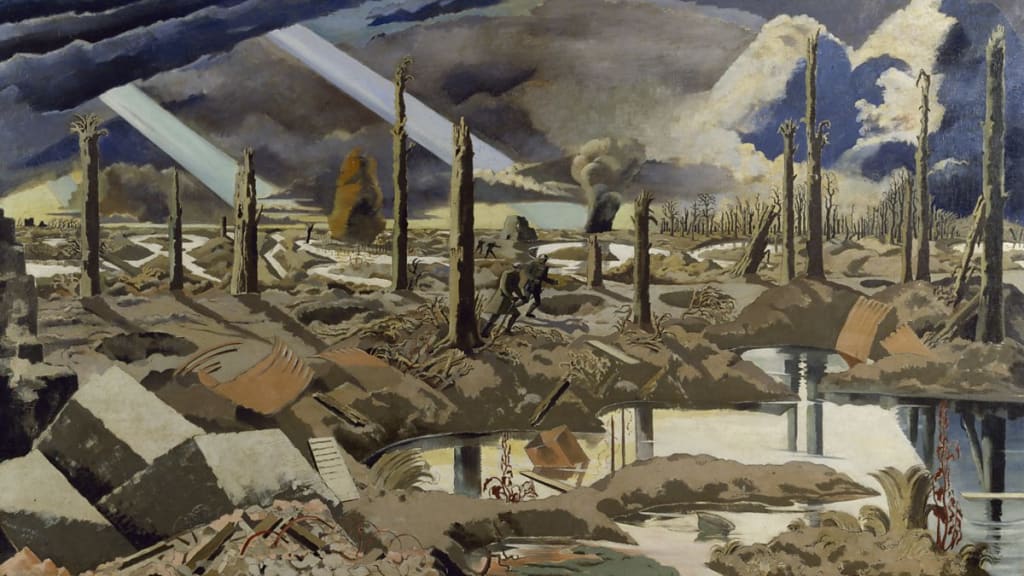T.S. Eliot's "The Waste Land"
And What It Says About Modern Day

"The Waste Land" is a wrathful attack on modern civilisation, stretching not only to the horror of the Great War but attacking the society that bore it. In his sobering evocations of ancient myths and Shakespearean lines, T.S. Eliot contrasts contemporary society with the past, atheism with belief; thus bringing about the breakdown and dysfunction of the society of "Wasteland."
"The Waste Land" has a great focus on death, which is one of the sources of this "dysfunction." In the first Canto, which roughly outlines the entire poem, Eliot begins his first stanza with the infamously contradictory line,
"April is the cruelest month."
April, the month of spring’s blossom, which has always been symbolic of life and rebirth, is here turned on its head by Eliot’s pessimism. Eliot argues that the expectation of the joys of Spring is cruel in its
"mixing Memory and desire,"
in other words, giving hope (desire) in regeneration to those who must bear the memory of the dead. Spring therefore becomes a painful reminder of death, particularly in the light of the recent Great War and its legacy on England’s young men. In the second canto, death is heard like church bells by the barmen’s haunting refrain,
"HURRY UP PLEASE IT’S TIME,"
which is powerful not only in its boldness and repetitiveness — showing the inhumanity of capitalism — but also in its lack of regard to the conversation that is going on between Lil and the other woman. The inhumanity of capitalism and industry is therefore compared with that of death. Like the barman, death comes without sympathy and strikes whenever it pleases. Though the two women are here the victims of this arbitrary ending, Lil herself has been a tool for death by aborting her children. Furthermore, abortion could be seen as a culmination of the human flaws of greed and lust, and was extremely taboo in Eliot’s society. It also highlights the dysfunction of society, since sex was by nature for procreation; it was man’s desire which twisted in from being the giver of life, that "gift of god," into a terrible moral dilemma.
Eliot further uses death to set the imagery of wasteland in the first Canto’s second stanza.
In lines like,
"I will show you fear in a handful of dust,"
in which he evokes the Christian saying "dust thou art, and unto dust shalt thou return," (Genesis 3:19), thus recalling mortality and comparing life with the weightlessness of "a handful of dust." His subsequent line,
"What branches grow out of this stony rubbish,"
establishes the atmosphere of his wasteland as ruined and tainted with atrocities of the recent war. "Branches" grow on ruined stones only since bombs and warfare have ravished the land and reduced buildings to rubble. Roots "clutch" onto the rubble to grow weak and pitiable stems from dead trees which "gives no shelter nor relief"; the same way a war-shaken civilization must struggle and clutch to return to its pre-war prosperity. Eliot further evokes the fading vision of pre-war society by "a heap of broken images" which man "cannot say, or guess" since they have only seen dysfunctional fragments.
Furthermore, "The Waste Land" constantly employs sex as prominent and architectural in expressing Eliot’s view of the dysfunction of human relationships. Another example of the evils of sexual urges is seen in the figure of Philomel, who was reduced to a nightingale after having been raped by the King. Whilst her songs (in which she sings her mournful tale) invoke no pity to dirty ears (contemporary brutes who have no ear for sympathy as a result of being hardened by war and modern society) and becomes "Jug Jug." The main dysfunction, however, was the dysfunction between "I" and the husband "Albert." Albert, whom Eliot suggests is shellshocked, returns to his wife but no longer speaks to her. She, on the other hand, is desperate to communicate with him, verbally and sexually. Eliot emphasis the extent of this dysfunction though her franticness, her "bad nerves," which further worsens until she vows to
"rush down as I am, and walk the street
With my hair down…What shall we ever do?"
The reconciliation between the two parties is doubly mocking in the form of "a game of chess," both in the cripplingly solitary nature of the game and the haunting silence it demands. It seems that these couples or rather, ex-lovers, can only interact in this most unloving and calculating of games. Furthermore, chess is a game; a means of wasting time away, as meaningless and mundane as general modern life.
Another dysfunctional relationship can be found in the next Canto between the "Bradford millionaire" and his typist. Eliot mockingly narrates this section in the voice of Tiersias, that ancient consular of seven generations of Theban Kings, including the ruined Creon and the great Odysseus. By putting this mundane incident on such a pedestal, Eliot highlights the frivolity of his time and the degradation of society, as Shakespeare was degraded to being "that Shakespearean Rag."
Eliot mocks the lovelessness of lovemaking between these two parties, the man buying sex with his position and wealth in the same way he has sex to show his power rather than his love for the woman. This is summarised by her line,
"well now that’s done: and I’m glad it’s over."
Like the first fable, Eliot mocks the impersonal and money-driven nature of his contemporary world; whom he sees walking up and down London, enslaved to society and time under the shadow of more ancient times, shown by the
"Inexplicable splendour of Ionian [Ancient Greek] white and gold."
This becomes a major theme in "The Waste Land." Eliot expresses his profound spleen for modern society in "The Waste Land" and uses the past to mock the present. He shows its dysfunction was created by the Industrial Revolution; though he never states this explicitly, it is implied from the mechanical nature of the society he describes. Not only did the Industrial Revolution enslave the population, it also gave birth to the weapons which enabled the atrocities of the War. Eliot further strengthens the theme of hopelessness and desolation by the line "the cricket no relief" which hints at the myth of the Sybil who was granted eternal life and not eternal youth, since she was reduced to the size of a cricket. Eliot compares this ancient fable with the state of mankind, who did survive the horrors of war in a state of desolation — perhaps unworthy to survive at all. The hyacinth, which in Ovid’s myth was a flower born from the blood of Hyacinth, Apollo’s lover, is a potent symbol of life, love and regeneration; it is employed by Eliot to show the opposite as she (the hyacinth girl) becomes mute and blind after the war. This shows man’s dysfunction after the war and the breakdown of society and human relationships. Sex without love is demonstrated by the allegorical nymphs by the Thames who left no addresses (and therefore were presumably one night stands), as well the invitation to a "demotic" luncheon which alludes to a decadent orgy in the Hotel and Metrpole. By giving us these little snapshots of life in regard to sex, Eliot portrays the hollowness of his society, which the war exemplifies.
Eliot underlines his whole poem with tarot cards as a haunting representation of fate. Eliot uses the mysticism of prophecy to highlight the medieval hopelessness of his modern world, which Tiresias was a daunting reminder of in the middle of the poem. The hollowness of his world is shown by the thirst of mankind; by there being,
"no water but only rock."
Eliot alludes not only to the lack of substance in his world, which gives thirst to those who do not simply walk up and down London to meaningless jobs; but also the ancestral myth of the pilgrim and the hermit, who roams the most desolate of lands. Eliot evokes here the ancestral cliché of life as pilgrimage, which further explains his title, "The Waste Land." Eliot harkens to the Bible in his pilgrim’s hallucination of a third man "who walks beside you." The religious importance of the last Canto can also be seen in word DA, which was the biblical response given by God to man who called on him in panic. Eliot compares the dysfunction of his contemporary world with the dysfunction of the world of the Old Testament. "Jew or Gentile" as he calls it (unifying both Judaism and Christianity) must face this apocalyptic wasteland which they have themselves introduced. When the meaning of life is lost to the middle-class world of industry and war, only Christian salvation is left for man to look forward to. The fifth Canto evokes the crucifixion, the "maternal lamentation" of the women who wept before Christ as he carried the cross to Golgotha. The line "he who was living is now dead" is a proclamation of the death of Christ while echoing Nietzsche’s statement, "God is dead and we have killed him" (Thus Spoke Zarathustra). One may argue that the crucifixion here described is in fact not that which the Bible has spoken of, but of the crucifixion of ancestral morals and order by the War and the new order of atheism and materialism. The War has created "a broken Corilanus," which symbolised the pride of man in his technological advancements, and thus from the ashes of the war man must be completely reborn from the wasteland. From the collapse of London Bridge (human civilization), the fisherman (mankind) must
"at least set my lands in order."
But he can only do so by fighting its dysfunction (these fragments) with Shantih ("peace" in Hindu), which is in other words inner peace, and therefore wisdom.






Comments
There are no comments for this story
Be the first to respond and start the conversation.